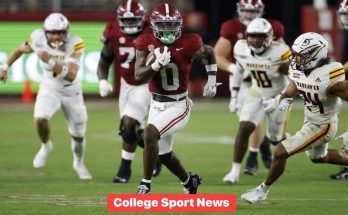In a stunning turn of events, five-star guard Darius Adams has decommitted from the University of Connecticut (UConn) and announced his commitment to the University of Tennessee Volunteers. This decision comes as a significant surprise to the college basketball community, as Adams was previously considered a cornerstone for UConn’s future. His shift in allegiance to Tennessee over other prominent programs like the University of Georgia and the University of Kentucky has sent shockwaves through the recruiting landscape.
Darius Adams’ Initial Commitment to UConn
Darius Adams, a 6-foot-5 guard from La Lumiere School in Indiana, originally committed to UConn in September 2024. At that time, he was ranked as the No. 19 recruit in the 2025 ESPN 100 basketball rankings, making him a highly coveted prospect. Adams chose UConn over other notable programs, including Michigan State and Tennessee, citing the program’s proximity to his New Jersey home and the coaching staff’s intensity and commitment to player development as key factors in his decision.
UConn’s head coach, Dan Hurley, had been instrumental in securing Adams’ commitment. Hurley’s reputation for developing players and his vision for the program resonated with Adams, who expressed excitement about the opportunity to be pushed hard and earn his place within the team. This commitment was seen as a significant win for UConn, bolstering their recruiting class and solidifying their backcourt for the future.
The Unexpected Decommitment
On February 9, 2025, Adams announced his decision to decommit from UConn, a move that caught many by surprise. While the specific reasons for his decommitment have not been publicly disclosed, such decisions are often influenced by a variety of factors, including changes in coaching staff, program dynamics, personal considerations, or a reassessment of the best fit for the player’s development and career aspirations.
Decommitments, while not commonplace, do occur in college basketball recruiting. They can significantly impact a program’s recruiting strategy and necessitate adjustments to roster planning. For UConn, losing a player of Adams’ caliber represents a notable setback, especially considering the anticipation surrounding his potential contributions to the team.
Commitment to the Tennessee Volunteers
Following his decommitment from UConn, Adams announced his commitment to the University of Tennessee. The Volunteers, under the leadership of head coach Rick Barnes, have been assertive in their recruitment efforts, aiming to elevate the program’s status within the competitive Southeastern Conference (SEC).
Adams’ decision to join Tennessee over other prominent programs like Georgia and Kentucky underscores the effectiveness of the Volunteers’ recruiting strategy and the appeal of their program. Factors that may have influenced Adams’ decision include the coaching staff’s vision for his role, the opportunity for immediate playing time, the program’s style of play, and the overall direction of Tennessee basketball.
Implications for Tennessee Basketball
Securing a commitment from a five-star recruit like Adams is a significant achievement for Tennessee. His addition to the roster is expected to bolster the team’s backcourt, providing a dynamic scoring threat and playmaking abilities. Adams is known for his three-level scoring, capable of making an impact from beyond the arc, mid-range, and at the rim. His versatility and basketball IQ make him a valuable asset on both ends of the floor.
For the Volunteers, Adams’ commitment enhances their recruiting class and signals the program’s upward trajectory. It reflects the coaching staff’s ability to attract top-tier talent and positions Tennessee as a formidable contender in the SEC. Fans and analysts alike will be keen to see how Adams integrates into the team and contributes to their pursuit of conference and national success.
Impact on UConn and the Broader Recruiting Landscape
Adams’ departure from UConn leaves a notable void in their recruiting class. The Huskies will need to reassess their recruiting strategy to address this unexpected change. However, UConn has a strong track record in player development and recruitment, and the coaching staff will likely intensify efforts to secure other high-caliber prospects to fill the gap left by Adams.
This development also highlights the fluid nature of college basketball recruiting. Commitments can change, and programs must remain adaptable and proactive in their recruiting approaches. For other programs like Georgia and Kentucky, missing out on Adams may prompt a reevaluation of their recruiting targets and strategies as they continue to build their rosters for the future.
Conclusion
Darius Adams’ decision to decommit from UConn and commit to the Tennessee Volunteers marks a significant shift in the college basketball recruiting landscape. His choice reflects the dynamic nature of recruitment and the various factors that influence a player’s decision-making process. As Adams embarks on his journey with Tennessee, both he and the program will be under the spotlight, with expectations high for what this partnership can achieve in the coming seasons.
For UConn, this development serves as a reminder of the challenges inherent in recruiting and the importance of resilience and adaptability. The Huskies will undoubtedly continue to pursue top talent and maintain their commitment to excellence on the court.
As the college basketball world absorbs this news, attention will turn to how these programs adjust and move forward, and how Darius Adams’ career unfolds with the Tennessee Volunteers.



